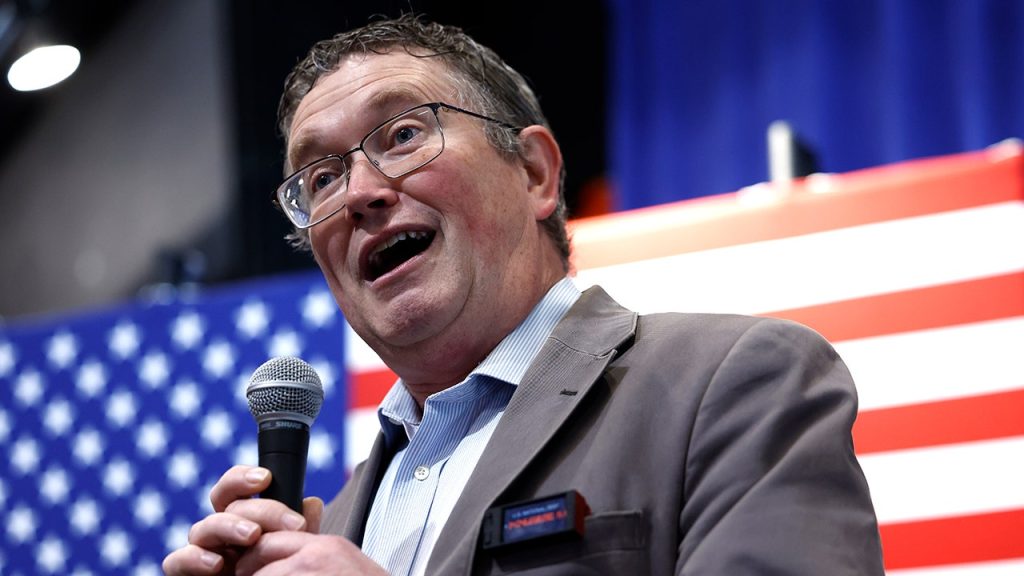Rep. Thomas Massie’s fiery analogy comparing US foreign aid to watering a neighbor’s yard while one’s own house burns has ignited a debate within the Republican Party regarding government spending, particularly in the context of a stopgap funding bill aimed at averting a government shutdown. Massie’s critique, amplified by an AI-generated image of House Speaker Mike Johnson seemingly oblivious to a burning house, underscores a growing fissure between fiscal conservatives and those willing to compromise on spending. This internal struggle highlights the challenges Republicans face in balancing competing priorities: fulfilling campaign promises of fiscal responsibility while navigating the practical realities of governing and addressing immediate needs, like disaster relief.
Massie’s pointed criticism targets what he perceives as misplaced priorities, arguing that allocating resources to foreign aid while domestic issues remain unresolved is akin to neglecting critical internal problems. This sentiment resonates with a segment of the Republican base concerned about the growing national debt and the perceived misuse of taxpayer dollars. The use of an AI-generated image, confirmed by Massie’s spokesperson to be created using Grok, adds a layer of satirical commentary to his message, visually depicting his perception of the government’s negligence. Entrepreneur Vivek Ramaswamy, known for his focus on fiscal responsibility, echoed Massie’s concern, emphasizing that the government’s use of “other people’s money” exacerbates the issue. This aligns with a broader conservative philosophy advocating for limited government intervention and prioritizing domestic needs over international commitments.
The debate over foreign aid extends beyond this specific instance, connecting to longstanding conservative calls for reduced government spending. Figures like Ron Paul have consistently advocated for eliminating foreign aid, a position that has garnered support from high-profile individuals like Elon Musk. The inclusion of both Ramaswamy and Musk in President-elect Donald Trump’s Department of Governmental Efficiency (DOGE) initiative further underscores the prioritization of cost-cutting within certain Republican circles. However, achieving consensus on significant spending cuts within the party remains a formidable challenge, as evidenced by Massie’s stark warning about the reluctance of some Republican colleagues to support such measures. This internal resistance hints at the potential for intra-party conflict as Republicans grapple with the complexities of fiscal conservatism in practice.
The recent government spending proposal, designed to prevent a partial shutdown, has further fueled the fire of this debate. While some Republicans, including Speaker Johnson, have defended the measure as necessary, conservative voices like Massie and Sen. Rand Paul have vehemently criticized it as excessive and fiscally irresponsible. Paul’s harsh condemnation of Johnson, labeling him “weak” and accusing him of complicity with Democrats, exposes the deep divisions within the party. This criticism also extends to the perceived hypocrisy of Johnson, who previously pledged to avoid a “Christmas omnibus” but ultimately supported a spending bill passed during the holiday recess. Massie’s labeling of Johnson as “NostraThomas” for predicting this move further emphasizes the distrust and frustration felt by fiscal conservatives.
Speaker Johnson’s defense of the spending bill revolves around its temporary nature, arguing that it merely postpones the larger funding debate until March, when Republicans will control both Congress and the White House. He also highlights the inclusion of disaster relief and aid for farmers as justifications for the spending. However, these arguments have done little to appease critics like Massie and Paul, who view the bill as another example of unchecked government spending and a betrayal of conservative principles. The clash between the pragmatic need to keep the government operating and the ideological commitment to fiscal restraint puts the Republican party in a precarious position, where any compromise is likely to draw fire from one faction or another.
The ongoing debate over government spending, exemplified by the clash over foreign aid and the stopgap funding bill, highlights a fundamental tension within the Republican Party. While a significant portion of the base demands fiscal responsibility and reduced spending, the practical realities of governing often necessitate compromises that can appear to contradict these principles. The challenge for Republican leadership lies in navigating this tension, finding a balance between fiscal prudence and addressing immediate needs without alienating key segments of their support base. The rhetoric surrounding these issues, especially the pointed criticisms directed at Speaker Johnson, suggests that this internal struggle is far from resolved and will likely continue to shape the party’s policy debates in the months and years to come.

